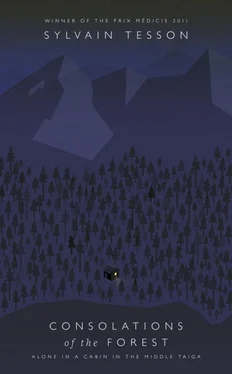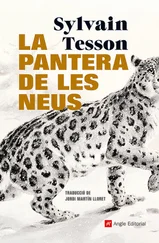At the third hour, I risk looking into the wind, towards the mountains to the west. Trees stand guard until the mountain shrugs them off at about 3,000 feet; canyons wind their way through the drapery of slopes. In four months, they’ll channel meltwater down into the bowl. Whenever I come abreast of them the wind redoubles in strength, from the funnel effect. To think that writers dare depict the beauty of such places…
I’ve read practically all of Jack London, Grey Owl, Aldo Leopold, Fenimore Cooper, a host of works by American nature writers, and I’ve never in reading a single one of those pages felt one-tenth of the emotion that fills me before these shores. And yet, I’ll keep on reading, and writing.
Two or three times an hour, a sharp crack breaks up my thoughts. The lake is shattering along a fault line. Like surf, birdsong or the roar of waterfalls, the crumpling of an ice mass won’t keep us awake. A motor running, or someone snoring or water dripping off a roof, on the other hand, is unbearable.
I can’t help thinking of the dead. The thousands of Russians swallowed up by the lake. [5] Perhaps the most famous example of ‘death by Baikal’ occurred during the Great Siberian Ice March of the Russian Civil War. Pursued by the Red Army, Admiral Kolchak’s White Russian troops retreated east in January and February of 1920 until their only way forward lay across the lake. Heading out in sub-zero temperatures made excruciating by the Arctic winds scouring the ice, around 30,000 soldiers, their families, pack animals, carts and possessions crossed to Transbaikal, but a great many people and animals froze to death along the way. For months the long trail of their corpses offered a macabre spectacle, until the spring thaw sent them and all the army’s abandoned baggage to the bottom of Baikal.
Do the souls of the drowned struggle to the surface? Can they get past the ice? Do they find the hole that opens up to the sky? Now there’s a touchy subject to raise with Christian fundamentalists…
It took me five hours to reach Elohin. Volodya welcomed me with a hug and a ‘Hello, neighbour’. Now there are seven or eight of us around the wooden table dunking biscuits in our tea: some fishermen passing through, myself and our hosts. We talk about our lives and I’m exhausted already. Intoxicated by the pot-luck company, the fishermen argue, constantly correcting one another with grand gestures of disgust and jumping down one another’s throats. Cabins are prisons. Friendship doesn’t survive anything, not even togetherness.
Outside the window, the wind keeps up its nonsense. Clouds of snow rush by with the regularity of phantom trains. I think about the tit. I miss it already. It’s crazy how quickly one becomes attached to creatures. I’m seized with pity for these struggling things. The tits stay in the forest in the icy cold; they’re not snobs like swallows, which spend the winter in Egypt.
After twenty minutes we fall silent, and Volodya looks outside. He spends hours sitting in front of the window pane, his face half in shadow, half bathed in the light off the lake. The light gives him the craggy features of some heroic foot-soldier. Time wields over skin the power water has over the earth. It digs deep as it passes.
Evening, supper. A heated conversation with one of the fishermen in which I learn that Jews run the world (but in France it’s the Arabs); Stalin, now there was a real leader; the Russians are invincible (that pipsqueak Hitler bit off more than he could chew); communism is a top-notch system; the Haitian earthquake was triggered by the shockwave from an American bomb; September 11 was a Yankee plot; gulag historians are unpatriotic; and the French are homosexuals.
I think I’m going to space out my visits.
26 FEBRUARY
Volodya and Irina live like tightrope walkers. They have no contact with the inhabitants on the other side of Baikal. No one crosses the lake. The opposite shore is another world, the one where the sun rises. Fishermen and inspectors living north or south of this station sometimes visit my hosts, who rarely venture into the mountains of their domain. They stay along the shoreline, at their outpost in the littoral zone, in equilibrium between the forest and the lake.
This morning Irina proudly shows me her library. In old editions from the Soviet era, she has works by Stendhal, Walter Scott, Balzac, Pushkin. The most recent book is The Da Vinci Code . A slight downswing in civilization.
And I go home by walking on the water.
27 FEBRUARY
The luxury of living alone in this world where being side by side will become the major problem. In Irkutsk, I learned that a French author had published a long novel entitled Ensemble, c’est tout. ‘Togetherness, It’s Everything.’ It’s a lot. It’s even the essential challenge, which I don’t believe we are meeting very well. The animal and vegetable biological organisms exist together in equilibrium. They destroy one another and reproduce within a greater, well-regulated harmony. Thanks to our frontal cortex, humans cannot manage to coexist in peace. Our music is out of tune.
It’s snowing. I’m reading Men Possessed by God , Jacques Lacarrière’s essay on eremitism in the Egyptian deserts in the fourth century. Dazzled by the sun, hirsute prophets abandoned their families for the desert, where they dragged out their lives in the Thebaid, the territory around ancient Thebes in Egypt. God never visited them there because, like any normal person, He preferred the magnificence of Byzantine domes. The anchorites wished to escape the temptations of their century, but some of them sinned through pride by confusing wariness towards their time with contempt for their fellow men. Not one of the anchorites returned to the world after tasting the poisonous fruit of the solitary life.
Societies do not like hermits and do not forgive them for their flight. They disapprove of the solitary figure throwing his ‘Go on without me’ in everyone else’s face. To withdraw is to take leave of one’s fellows. The hermit denies the vocation of civilization and becomes a living reproach to it. He is a blot on the social contract. How can one accept this person who crosses the line and latches onto the first passing breeze?
At four in the afternoon, an impromptu visit from Yura. He’s the meteorologist at the Uzuri weather station on Olkhon, the largest island in Lake Baikal.
The ice has opened up where it meets the beach: four feet of water are preventing vehicles from crossing to land. New snow has made my shore pristine again. Yura parks his van at the edge of the fracture. He’s taking an Australian woman, a tourist, around the lake.
I set the vodka glasses on the table, and we become gently drunk in the foetal warmth. The Australian woman doesn’t quite get the picture. We have a brief exchange in English.
‘Do you have a car?’ she asks.
‘No,’ I reply.
‘A TV?’
‘No.’
‘What if you have a problem?’
‘I walk.’
‘Do you go to the village for food?’
‘There is no village.’
‘Do you wait for a car on the road?’
‘There is no road.’
‘Are those your books?’
‘Yes.’
‘Did you write all of them?’
I prefer people whose character resembles a frozen lake to those who are more like marshes. The former are cold and hard on the surface, yet deep, roiling and alive underneath, whereas the latter seem soft, spongy, but inert and impermeable at the core.
The Australian appears leery of sitting on the upended logs I use as stools. She gives me strange looks. My untidiness must reinforce her opinions of the backwardness of the French people. When my guests leave, I’m as tight as a tick and it’s time to do some ice skating.
Читать дальше












